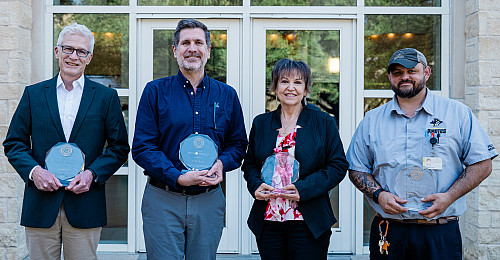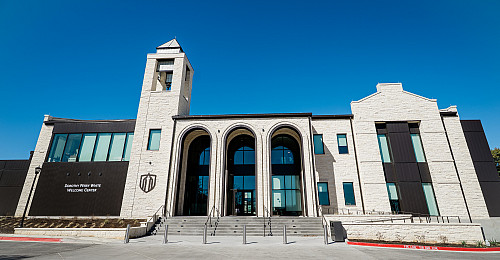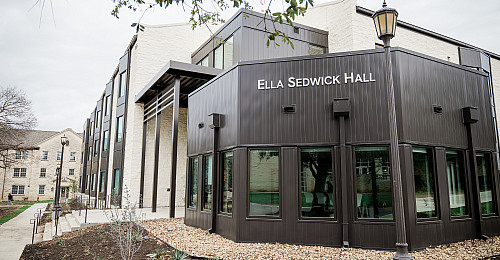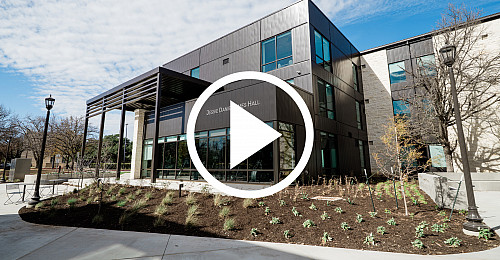News
Hands-on Learning
January 08, 2018
January 08, 2018
Open gallery

If you want to liven up the atmosphere at party, bring up the term “artificial intelligence.” AI is a hot topic these days, with strong opinions on both ends and blurred lines between fact and fiction. Elon Musk, tech entrepreneur extraordinaire, is often quoted proclaiming that AI is “the most serious threat to the survival of the human race.”
Are his fears rational? Are we doomed to be overtaken by the very robots we created? Like dinosaurs in Jurassic Park, will computers turn on us and wipe out our existence?
Not so fast, according to AI expert Jacob Schrum ’06, Assistant Professor of Computer Science at Southwestern. “The threat of computers becoming so smart and self-aware that they decide to destroy humanity in some sort of dramatic fashion is itself dramatic and overblown.”
Instead, Professor Schrum sees the overwhelming advancements and positive contributions that AI makes across multiple industries—not only in health, science and engineering, but also in arts, music, humanities and more—so he doesn’t lose sleep worrying that his computer will turn on him in the middle of the night. Instead, he reasons, the real threat of AI to the human way of life lies in the form of automation. “More jobs are going to be replaced by machines fairly soon, and I don’t think our society is poised to handle the economic impact.” He also stresses that “ethics play a critical role in how we design systems, and must be considered at all times and all stages.”
Jacob first became interested in computers the way many kids do —playing video games. He grew up on games like “Street Fighter”, “Diablo”, and the original “Doom”. He knew early on that he wanted to incorporate his passion for computer science into his academic studies and later his career. When he entered Southwestern in the fall of ’02, Jacob already had several AP credits from high school and some useful programming experience. He jumped right into college life, not only taking CS classes toward his major, but branching out to a variety of subjects.
Jacob took German in high school and continued studying the language at SU. He studied abroad in Germany his junior year, where his coursework included math classes. When asked if it was hard taking math in a foreign language he admitted “I didn’t have a language problem, but I DID have a math problem.” Because the curriculum was different in Germany, the classes covered topics he hadn’t yet been exposed to back in the states.
After encouragement from German professor Erika Berroth, he decided to add a German major, in addition to majors in Mathematics and Computer Science. Because, well, why double major when you can triple major?
Another one of Jacob’s SU professors, Walt Potter, had a profound impact on him. His teaching style was different than what Jacob was used to, and it forced him out of his comfort zone. Dr. Potter stirred conversations and stimulated debate both in and out of the classroom.
Reflecting on his time at SU, Jacob credits his SU professors for giving him the tools he needed to succeed in graduate school. The exposure to a variety of courses helped become better prepared, particularly in the area of theory, than many of his classmates when he entered The University of Texas.
While completing his Ph.D. in Computer Science at UT, Jacob earned the Computer Science Department’s Teaching Assistant Excellence Award for the Fall 2012. He collaborated with and won the grand prize at Botprize, an international competition to design simulated agents with human-like behavior in a first-person shooter video game, “Unreal Tournament.”
In 2014, Jacob’s professional career took him full circle and back to Southwestern University, where he is now an Assistant Professor of Computer Science. Jacob’s office in Mood-Bridwell Hall is scattered with puzzles and games, inviting students to stop by with questions or for an informal chat. He has an open-door policy, and makes it a point to interact with students both inside and outside of the classroom. He reflects on his days as an SU student, and believes that the access to professors and the mentorship they provided played a pivotal role in his success today.
Now that he’s on the other side of the desk, Jacob makes it a point to offer that same guidance to his students. And not just when it comes to computers. You can often find him eating lunch at the German table, interacting and practicing the language. He keeps fencing equipment in his office, and when he has time he’ll attend one of Coach Gary Murray’s fencing classes on campus, the same coach who taught him when he was at SU.
This diverse set of interests and activities is by design. Jacob intentionally makes it a point to get involved in things other than computers, and stresses the importance of having hobbies or other outlets to his students. “If you’re doing the same thing over and over you get fatigued because you’re using the same mental muscles. It’s important to mix it up.”
He’s on sabbatical this semester, working on research including an interactively evolved art study with students Isabel Tweraser ’19, double major in CS and Music and Lauren Gillespie ’19, double major in CS and Chemistry. This research will be submitted in January for consideration to the Genetic and Evolutionary Computation Conference (GECCO) which will be held in Kyoto, Japan. Jacob and Lauren attended last year’s GECCO conference in Germany, where Lauren presented on the paper she co-authored with Jacob and Gabriela Gonzalez ’16, “Comparing Direct and Indirect Encodings Using Both Raw and Hand-Designed Features in Tetris.”
In addition to his neural networks research, Jacob regularly consults for SparkCognition, an Austin cognitive security analytics startup that “applies machine learning & AI to cloud security and the internet of things.” In his work with SparkCognition, Jacob uses his knowledge of NeuroEvolution of Augmenting Topologies (NEAT), which is a genetic algorithm for the evolution of artificial neural networks developed by Kenneth Stanley while at The University of Texas. Ken invented NEAT when he was a graduate student under the supervision of Risto Miikkulainen, who later became Jacob’s Ph.D. advisor at UT as well. Jacob’s high level of expertise in NEAT proves highly valuable for the company, and consulting gives him another avenue to share his knowledge of neural networks and mentor those in his AI industry.
The ability to simplify complex material—algorithms, concepts, theories, etc.—and explain them in a way that others can understand them—is one of the biggest challenges of teaching. Jacob has deep expertise in the area of Artificial Intelligence, but when he teaches, he engages with people at their level. He makes a point to get to know his students and their interest and connect with them on their terms.
One of the things Jacob appreciates about Southwestern is the intentional focus on interdisciplinary learning and diverse thinking. Students are encouraged to take risks and explore areas outside of their academic disciplines, and to become more inclusive. He encourages his students to ask questions and engage both inside and outside of class. “It’s where those ah-ha moments are born.”
He also advises students to gain real experience. He can teach the concepts in class, but “there is nothing like hands-on learning. Students appreciate material better when they do it in practice or on a larger magnitude.” He also stresses that students shouldn’t worry about any type of social hierarchy when it comes to learning. They should take risks and ask questions. “Your learning is more important than your fear of looking ignorant.”
He would also like to see more diversity in the field—not only more women, but diversity of thought. “AI needs people who will think differently and aren’t afraid to take risks. It needs different perspectives to avoid the groupthink mentality and increase the chance that someone will speak up and ask the important questions. It needs people to consider multiple viewpoints, including those on ethics.” Many of Jacob’s brightest CS students double major or minor in other fields. This interdisciplinary learning makes them better prepared to innovate and succeed in whatever career paths they choose.
And on that note, he tells them not to “assume that everyone is smarter than you. They may have been exposed to more, or learned about a subject earlier, but that will even out.” He thinks back to his math classes in Germany. His classmates weren’t necessarily smarter than him, they were simply exposed to the concepts earlier. He caught up and it all evened out.
Actually, it looks like it more than evened out. Schrum is doing brilliant, groundbreaking work in a field he loves.
In the case of Schrum vs. the bots, my money’s on Schrum.
















